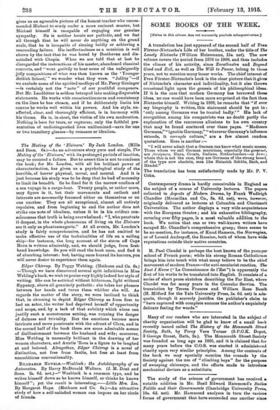SOME BOOKS OF THE WEEK.
[Notice in This column does not necessarily preclude subsequent rerien.1
A translation has just appeared of the second half of Fran Forster-Nietzsche's Life of her brother, under the title of The Lonely Nietzsche (William Heinemann, 15s. net). The new volume covers the period from 1876 to 1900. and thus includes the climax of his activity, since Zarathustra and Beyond Good and Evil, as well as The Will to Power, belong to these years, not to mention many lesser works. The chief interest of Frau Forster-Nietzsche's book is the clear picture that it gives of Nietzsche's character and individuality, but it also throws occasional light upon the genesis of his philosophical ideas. If it is the ease that modern Germany has borrowed these ideas, no one would have been more surprised at the fact than Nietzsche himself. Writing in 1888, he remarks that "if ever my biography is written, this statement should be put in: ' only among Germans was he treated badly.'" His lack of recognition among his compatriots was no doubt partly the explanation of the rancorous allusions to Ina own country that may be found scattered over these pages. "Mediocre Germans," " ignoble Germany," "'wherever Germany's influence extends, it corrupts culture," are a few almost random quotations. Here is another :—
"I will never admit that a German can know what music' means. Those whom we call German musicians, especially the greatest, are foreigners, Slays, Croats, Italians, Netherlanders—or Jews; where this is not the case, they are Germans of the strong breed, of the type now obsolete, men like Heinrich Schatz, Bach, and
Handel."
The translation has been satisfactorily made by Mr. P. V. Cohn.






































 Previous page
Previous page